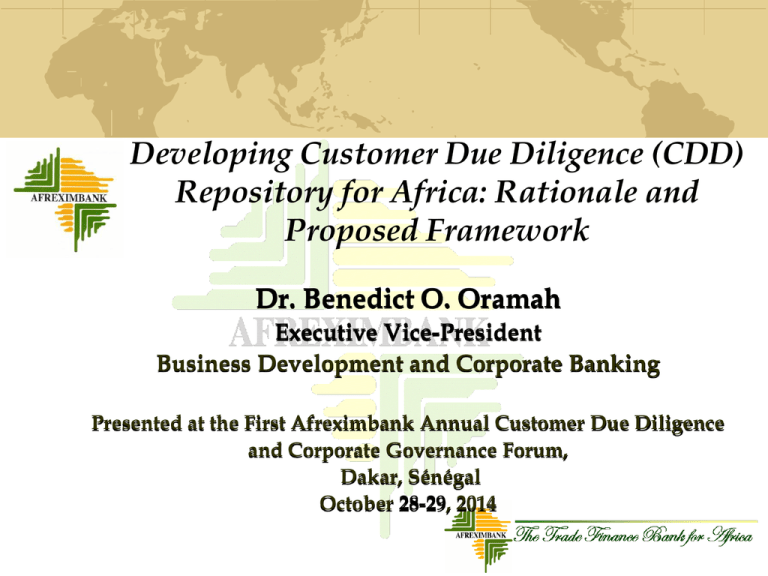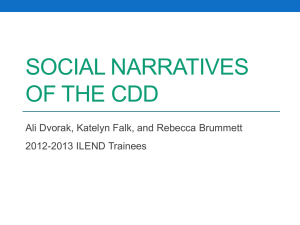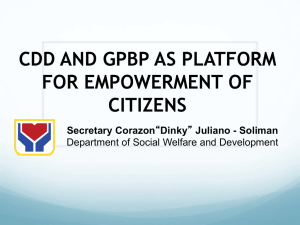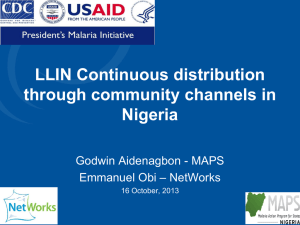CDD Repository Presentation FINAL - African export
advertisement

Developing Customer Due Diligence (CDD) Repository for Africa: Rationale and Proposed Framework Dr. Benedict O. Oramah Executive Vice-President Business Development and Corporate Banking Presented at the First Afreximbank Annual Customer Due Diligence and Corporate Governance Forum, Dakar, Sénégal October 28-29, 2014 Outline of Presentation → Introduction → The Costs of Compliance → Implications for African Trade and Trade Finance → Solutions by Afreximbank → The Need for an African CDD Repository (ACDDR) → The Way Forward → Conclusions (2) Introduction (3) • Why Customer Due Diligence? Rising global concerns about: Terrorism financing Bribery and Corruption Fraud and other criminal activities Call for action from various quarters, including the UN to deal with these concerns in order to preserve global peace, security and integrity of financial systems (4) Results have been: Institution of various regulations, laws, principles etc. at both national, regional and global levels to curb funds flows related to those activities; Definition of, and institution of best practices in corporate governance; Enforcement of these laws and regulations which has created the need for vigilance in the operations of economic actors, especially financial institutions; and The elevation of compliance with these regulations, laws, practices and principles to priority levels in the regulatory and law enforcement agenda in many countries as well as the multilateral levels. (5) Violation of relevant laws and regulations can be costly, e.g. Bank of America Corporation, in 2014, was fined US$7.65 million for violating internal controls and recordkeeping provisions of the federal securities laws; BNP Paribas SA agreed to pay nearly US$9 billion for undertaking transactions prohibited by the U.S; Barclays paid US$280 million to settle a lawsuit filed by the US Federal Housing Agency over securities the bank sold to Fannie Mae and Freddie Mac during the housing bubble; The failure of some corporate giants, such as Enron and the Accounting giant, Arthur Anderson were related to corporate governance and compliance problems; (6) Credit Suisse paid $885 million to the US Federal Housing Finance Agency over charges the Swiss bank misled investors about mortgage-backed securities; Credit Suisse paid $196 million to the US Securities and Exchange Commission, settling charges of providing brokerage and advisory services to foreign clients without regulatory permission; Clearstream, a division of Deutsche Bank paid the US Treasury Department US$152 million to settle allegations that it held securities in the U.S. on behalf of the central bank of Iran; and Operating Licenses can also be withdrawn and key officers of offending entities can face criminal charges and jailed as in the cases of Enron, Worldcom, etc. (7) Costs of Compliance (8) But compliance with CDD regulations is not costless! What are the Costs of Compliance? Compliance costs are rising by the day for many organizations, especially financial institutions. These costs are both direct and indirect. Some of the direct costs include: Creation of new positions and hiring of additional staff for Customer Due Diligence activities; IT investments to ensure proper data gathering and reporting; Increased cost of data gathering on existing and/or potential customers; High training costs; High costs of complying with regulatory reporting requirements; and Increased cost of on-boarding customers and clients. (9) Indirect Costs include: Possible customer alienation due to intrusive information demands, frequent information requests, etcetera; Poor quality service that may arise by actions of inexperienced staff in implementing compliance regulations; Possible loss of business that may arise from lack of standardization in approach to compliance issues; Organizations can be exposed to unintended operational risks while trying to comply with CDD Regulations, e.g. Lawsuits that may arise from: Classifying a legal transaction as illegal (10) What would happen if financial sector players do not comply with CDD Laws and Regulations? Banks can become subject to elevated Operational (Legal and Reputational) risks, which can result in : withdrawal of funds by depositors; the termination of inter-bank facilities; Withdrawal of correspondent banking services; investigation costs; asset seizures and freezes; loan losses; and Corporate failures. (11) Other potential costs of non-compliance include: Loss of customers and even shareholders of the company who may worry about safety of their investments; Diversion of considerable management time and energy to resolving problems that may arise; and Overall reputational damage (12) Implications for African Trade and Trade Finance (13) What are the Implications for African Trade and Trade Finance? These days banks add compliance costs in the cost/benefit analysis regarding the correspondent banking relationships they can keep. Where additional direct and indirect compliance costs outweigh the benefits, the relationships are cancelled. Many relatively small African banks have therefore had their correspondent banking lines cut as the compliance costs of the relationships are considered too high relative to the benefits. (14) As compliance costs rise, Africa is likely to face: Reduced access to trade services, including letter of credit services; Cuts in trade and project finance; Higher costs of trade and project finance as compliance costs push up the marginal costs of doing business with African entities; and Reduced export competitiveness, especially for non-traditional exports given higher costs of export finance. (15) The challenge of CDD compliance may stunt Africa’s leadership in mobile payments for SMEs in supply chains and money remittances with implications for financial flows and financial inclusion in Africa; These developments also have the potential of expanding the informal sector in Africa as those who cannot meet the costs of new compliance requirements find alternative ways of conducting business. This will be an undesirable outcome. (16) Solutions By Afreximbank (17) Underpinning Principles Afreximbank believes that compliance with generally acceptable CDD and corporate governance principles and practices is desirable and in fact makes good business sense The Bank also recognizes the costs of compliance and implications of emerging CDD compliance developments on African trade and trade finance These principles underline solutions the Bank is offering to its partner African Banks and corporates so as to optimize the value proposition CDD compliance requirements present. (18) The Solutions African Correspondent Banking and Letter of Credit Confirmation Scheme, branded Africorrbanking This is an Afreximbank product that provides a comprehensive suite of correspondent banking services to its African trade finance intermediaries; The Bank partners with leading international Banks to deliver a cobranded product aimed at expanding access of African banks to correspondent banking services that are tailored to specific banks’ needs. It is designed to be efficient, reliable and flexible; costeffective; Africa-friendly; and leverages on long-term relationships that the Bank has built with potential beneficiary banks; (19) Africorrbanking Scheme African Export-Import Bank LC Issuer Afrexim provides a Guarantee to LC confirming against LC issuer’s risk 1 2 3 LC issuance sent to Confirming Bank Confirming Bank sends a Guarantee request to Afreximbank 4 Confirming Bank Confirming Bank adds confirmation to LC on the strength of Afreximbank’s Guarantee Exporter Bank (20) Under the Scheme, the Africorrbanking Partners (APs) (international banks) confirm and advise Letters of Credit, make international payments and provide other correspondent banking services to Afreximbank’s trade finance intermediaries (TFI) being African banks. The Bank supports the Africorrbanking partners by: o Issuing Irrevocable Reimbursement Undertakings (IRUs) to back the Letters of Credit issued by the Trade Finance Intermediaries for confirmation; o Making available CDD information the Africorrbanking Partners require for on-boarding the banks as clients The CDD information service is a major distinguishing feature of Afreximbank’s offering from similar products offered by other multilateral financial institutions (21) Creating an African Customer Due Diligence Repository (ACDDR) for African institutions: In support of Africorrbanking and to reduce the cost of compliance for maintaining African businesses by international banks and global trading entities, the Bank is in the process of launching ACDDR. This cost reduction will help mitigate the negative implications of current CDD requirements on African trade and trade finance (22) The Need for an African CDD Repository (ACDDR) (23) • What is the African Customer Due Diligence Repository (ACDDR) ? It is a central repository for gathering and storing key information required to conduct customer due diligence checks on African counterparties in accordance with international best practices (24) • What is the Goal of ACDDR? It aims to help banks comply with increasing compliance regulation, providing a centralized source of customer due diligence information. To reduce the costs of conducting CDD on African banks and businesses thereby enlarging their access at competitive costs, to trade services, trade and project financing. To inculcate best practices in CDD practices across Africa by ensuring that participants in the scheme provide information in an organized and standardized format. To ease access to the information through the use of an online platform. (25) • What are the Benefits? Smoothening of Customer on-Boarding The development of that CDD Repository will facilitate the smooth on-boarding of customers by banks in Africa. It will also make it easier for international banks to on-board potential African clients. Reduce Regulatory Risks The availability of CDD information would reduce subjective evaluation of customers, improve customer insight, and mitigate regulatory risk with integrated, risk-based screening automated, systematic, multi-factor customer assessment. (26) and Ensure Consistency of Compliance Processes As They Concern African Entities Automated and centralized risk evaluation process will drive consistent decision making, increase operational transparency, and eliminate redundancy of multiple systems – minimizing inconsistencies in compliance processes. Information collection will significantly improve for all participants and users through the creation of the CDD Repository Increased Efficiencies and Cost Reduction The Repository is expected to reduce operational workloads of users by focusing marketing staff on marketing and growth of business in pipelines rather than responding to complex series of CDD queries. (27) Enhancement of Customer Relationships Through the successful implementation of the system, banks will be able to meet customer expectations in terms of speed and efficiency, while ensuring regulatory compliance, to improve overall customer experience and relationships. Banks will also be able to effectively manage institutional relationships better with efficient CDD processes, identify beneficial ownerships, and understand commercial clients’ risk and business needs. The standardization of processes the CDD may engender will “commoditize” CDD activities reducing the risk of customer dissatisfaction for individual banks. It will also make it easier for banks to compete based on normal parameters and not on stringency of CDD processes. (28) Sharing of Experience The CDD Repository will provide a platform for experience sharing amongst all participants which will improve expertise in this area. (29) • How about Existing CDD Repositories? Undoubtedly, there are many CDD Repositories globally. Some of these include: Bankers Almanac’s Due Diligence Repository KYC Exchange Net SWIFT’s KYC Registry (30) • Challenges with Existing CDD Repositories The CDD Repositories created so far have largely focused on entities in developed and some other developing markets with little to no focus on Africa; Many are industry specific. For instance, the Bankers Almanac Due Diligence Repository focuses on commercial banks based in Europe, North America and other advanced economies and a few from developing markets. Most African banks remain unlisted in the Bankers Almanac Due Diligence Repository; High cost of subscription discourages African financial institutions and other corporates to subscribe to these platforms. (31) • Filling the Gap for Africa Due to the challenges with existing CDD Repositories, it was important that an Africa- Focused CDD Repository be developed. Afreximbank has taken a lead role in creating a platform to cover CDD matters with a special emphasis on African financial institutions and African corporates An Africa CDD Repository will enable global institutions and partners to access the CDD information on African financial institutions much cheaper compared to other solutions. The proposed platform is called “Africa Customer Due Diligence Repository Platform (ACDIRP)” (32) • What Information will be contained in the ACDIRP? The Repository shall contain among other information the following: Corporate license, licenses of subsidiaries and offshore license (if any); Beneficial ownership and group structure - list of owners; regulator (s) Other identifying information, such as addresses; Copies of corporate documents, such as: o Company by-laws o Memorandum, Articles and/or Certificate of Incorporation o Memorandum, Articles and/or Certificate of Association o Extract from commercial register o Biographies of board members and senior management. Annual Report, including Annual Reports of its subsidiaries; Credit History (33) Special Information on: o Sanctions, and o Criminal records, etc. ACDIRP will be an Online platform to be managed by Afreximbank (34) The Way Forward (35) 1. Development of a CDD Repository Charter The first step is to create a Charter for the use and management of the platform. The Charter, to be known as the African Customer Due Diligence Repository Charter, will outline the rights and privileges of members who subscribe to the platform. Participants will be African institutions that will provide CDD information; and others who will subscribe to access the CDD information. 2. Create the CDD Repository Platform The second step is to create the online CDD Repository. The Bank plans to create an Africa-wide platform for the benefit of all financial institutions in the continent. The platform would be called the “African Customer Due Diligence Repository Platform (ACDIRP)” (36) 3. Launching the Platform and Subscription by African Banks The next step is to launch and introduce the platform to partner banks in Africa through a workshop or other fora. This will help create a critical mass of CDD information for the platform. The Bank will promote the platform for subscription by international financial institutions to facilitate their CDD activities in Africa in the hope that this will: reduce the risk perception of the continent and corporates in the continent; and reduce the immense cost of their CDD activities in Africa. (37) ONE OF OUR GOALS IN ORGANIZING THIS SEMINAR IS TO BUILD A CORE GROUP TO CHAMPION THIS INITIATIVE INTERESTED PARTIES SHOULD REGISTER AT THE BANK’S TEMPORARY SECRETARIAT FOR THIS SEMINAR (38) Conclusions (39) The Bank will engage all participants gathered here and those not here to continue to strengthen CDD processes in Africa given the benefits. Considering the importance of CDD to financial performance and Africa’s trade performance, we encourage all African financial institutions to enroll in the ACDIRP platform without delay. (40) Thank You (41)









